电子科技大学听力测试-2004真题(复试)
电子科技大学历年分数线2004-2011 (2)
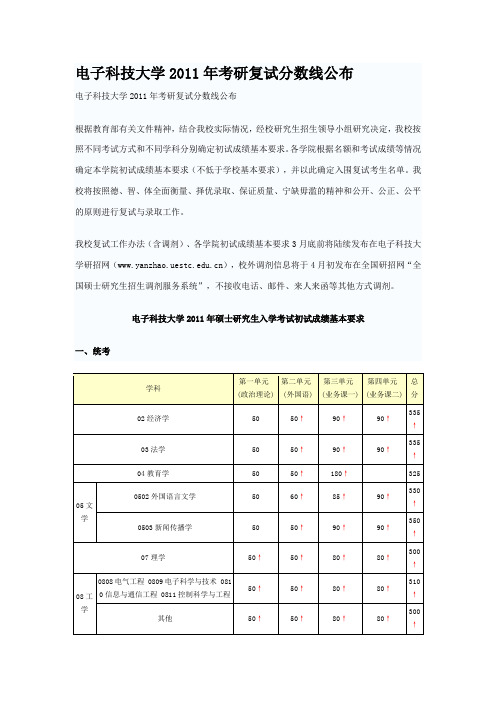
电子科技大学2011年考研复试分数线公布电子科技大学2011年考研复试分数线公布根据教育部有关文件精神,结合我校实际情况,经校研究生招生领导小组研究决定,我校按照不同考试方式和不同学科分别确定初试成绩基本要求。
各学院根据名额和考试成绩等情况确定本学院初试成绩基本要求(不低于学校基本要求),并以此确定入围复试考生名单。
我校将按照德、智、体全面衡量、择优录取、保证质量、宁缺毋滥的精神和公开、公正、公平的原则进行复试与录取工作。
我校复试工作办法(含调剂)、各学院初试成绩基本要求3月底前将陆续发布在电子科技大学研招网(),校外调剂信息将于4月初发布在全国研招网“全国硕士研究生招生调剂服务系统”,不接收电话、邮件、来人来函等其他方式调剂。
电子科技大学2011年硕士研究生入学考试初试成绩基本要求一、统考学科第一单元(政治理论)第二单元(外国语)第三单元(业务课一)第四单元(业务课二)总分02经济学50 50↑90↑90↑335↑03法学50 50↑90↑90↑335↑04教育学50 50↑180↑32505文学0502外国语言文学50 60↑85↑90↑330↑0503新闻传播学50 50↑90↑90↑350↑07理学50↑50↑80↑80↑300↑08工学0808电气工程 0809电子科学与技术 0810信息与通信工程 0811控制科学与工程50↑50↑80↑80↑310↑其他50↑50↑80↑80↑300↑11军事学50↑50↑80↑80↑30012管理学1201管理科学与工程 1202工商管理50 50↑90↑90↑350↑1204公共管理50 50↑90↑90↑330↑专业学位0552翻译硕士40 50 85 90 300 0553新闻与传播硕士50 50 90 90 330 0852工程硕士50↑45↑80↑80↑285↑1251工商管理硕士45↑90 1601252公共管理硕士40 90155↓1256工程管理硕士50 90 160 分析变化:(箭头表示与2010年该校分数线对比变化↑表示上升↓表示下降)二、单考学科第一单元 (政治理论)第二单元 (外国语)第三单元 (业务课一)第四单元 (业务课二)总分04教育学60↓55↑260↑310↓其他60↓55↑85↓75↓310三、强军计划学科第一单元 (政治理论) 第二单元 (外国语) 第三单元 (业务课一) 第四单元 (业务课二) 总分所有60 40 60 60↓260↓四、少数民族骨干计划按国家初试成绩基本要求执行。
2004年高考全国卷英语听力试题(含试题、听力音频、听力原文和答案)
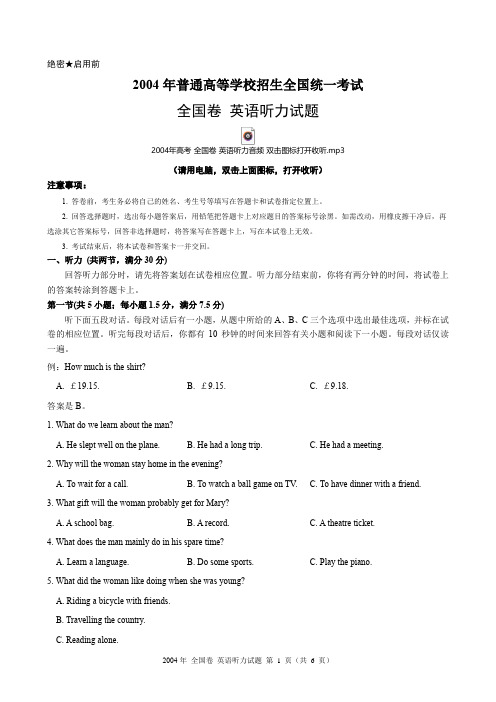
绝密★启用前2004年普通高等学校招生全国统一考试全国卷英语听力试题2004年高考 全国卷 英语听力音频 双击图标打开收听.mp3(请用电脑,双击上面图标,打开收听)注意事项:1. 答卷前,考生务必将自己的姓名、考生号等填写在答题卡和试卷指定位置上。
2. 回答选择题时,选出每小题答案后,用铅笔把答题卡上对应题目的答案标号涂黑。
如需改动,用橡皮擦干净后,再选涂其它答案标号,回答非选择题时,将答案写在答题卡上,写在本试卷上无效。
3. 考试结束后,将本试卷和答案卡一并交回。
一、听力(共两节,满分30分)回答听力部分时,请先将答案划在试卷相应位置。
听力部分结束前,你将有两分钟的时间,将试卷上的答案转涂到答题卡上。
第一节(共5小题;每小题1.5分,满分7.5分)听下面五段对话。
每段对话后有一小题,从题中所给的A、B、C三个选项中选出最佳选项,并标在试卷的相应位置。
听完每段对话后,你都有10秒钟的时间来回答有关小题和阅读下一小题。
每段对话仅读一遍。
例:How much is the shirt?A. £19.15.B. £9.15.C. £9.18.答案是B。
1. What do we learn about the man?A. He slept well on the plane.B. He had a long trip.C. He had a meeting.2. Why will the woman stay home in the evening?A. To wait for a call.B. To watch a ball game on TV.C. To have dinner with a friend.3. What gift will the woman probably get for Mary?A. A school bag.B. A record.C. A theatre ticket.4. What does the man mainly do in his spare time?A. Learn a language.B. Do some sports.C. Play the piano.5. What did the woman like doing when she was young?A. Riding a bicycle with friends.B. Travelling the country.C. Reading alone.第二节(共15小题;每小题1.5分,满分22.5分)听下面5段对话或独白。
2004年英语听力(全国卷II)听力真题+答案
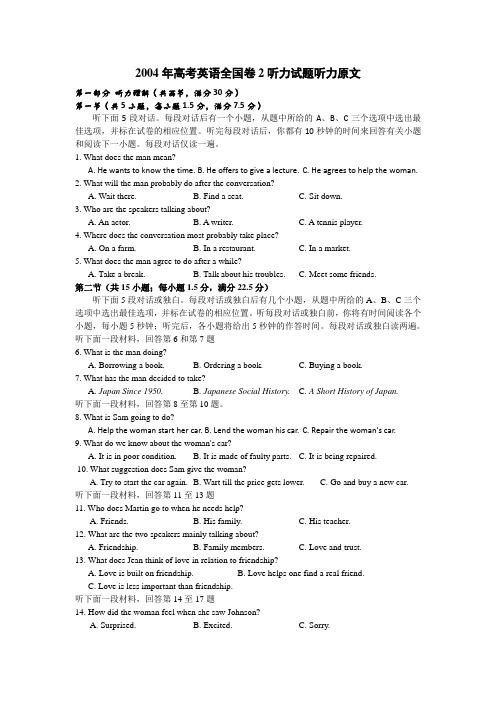
2004年高考英语全国卷2听力试题听力原文第一部分听力理解(共两节,满分30分)第一节(共5小题,每小题1.5分,满分7.5分)听下面5段对话。
每段对话后有一个小题,从题中所给的A、B、C三个选项中选出最佳选项,并标在试卷的相应位置。
听完每段对话后,你都有10秒钟的时间来回答有关小题和阅读下一小题。
每段对话仅读一遍。
1. What does the man mean?A. He wants to know the time.B. He offers to give a lecture.C. He agrees to help the woman.2. What will the man probably do after the conversation?A. Wait there.B. Find a seat.C. Sit down.3. Who are the speakers talking about?A. An actor.B. A writer.C. A tennis player.4. Where does the conversation most probably take place?A. On a farm.B. In a restaurant.C. In a market.5. What does the man agree to do after a while?A. Take a break.B. Talk about his troubles.C. Meet some friends.第二节(共15小题;每小题1.5分,满分22.5分)听下面5段对话或独白。
每段对话或独白后有几个小题,从题中所给的A、B、C三个选项中选出最佳选项,并标在试卷的相应位置。
听每段对话或独白前,你将有时间阅读各个小题,每小题5秒钟;听完后,各小题将给出5秒钟的作答时间。
每段对话或独白读两遍。
电子科技大学研究生历年学位英语考试试题及答案(8)(共5篇)
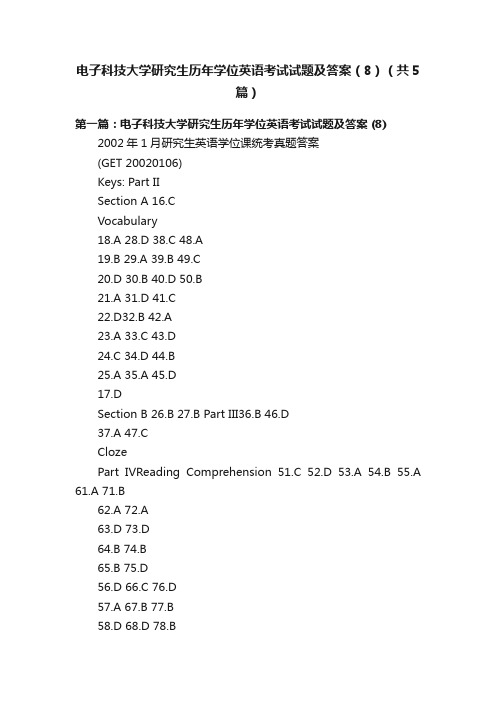
电子科技大学研究生历年学位英语考试试题及答案(8)(共5篇)第一篇:电子科技大学研究生历年学位英语考试试题及答案 (8) 2002年1月研究生英语学位课统考真题答案(GET 20020106)Keys: Part IISection A 16.CVocabulary18.A 28.D 38.C 48.A19.B 29.A 39.B 49.C20.D 30.B 40.D 50.B21.A 31.D 41.C22.D32.B 42.A23.A 33.C 43.D24.C 34.D 44.B25.A 35.A 45.D17.DSection B 26.B 27.B Part III36.B 46.D37.A 47.CClozePart IVReading Comprehension 51.C 52.D 53.A 54.B 55.A61.A 71.B62.A 72.A63.D 73.D64.B 74.B65.B 75.D56.D 66.C 76.D57.A 67.B 77.B58.D 68.D 78.B59.B 69.D 79.C60.C 70.D 80.CPaper TwoPart V TranslationSection A 【英译汉】对于一个公司产品的准确预测取决于该公司产品的知名度。
对于许多硅谷人来说,这一点令人感到无可奈何。
成长呈急剧上升趋势的新兴产业对其产品在最初几年的出色表现几乎总是惊讶不已,随后,当产品需求下降时他们又会感到手足无措。
斯坦福大学的一位商业策略教授说:“在一个充满活力和变数的市场,人们是会犯错误的。
这是由市场的内在本质所决定的。
”在硅谷的许多地方,以及在其他的地方,不可预测性是无法避免的。
解决之道是:不断创新,但同时又要开发出优良的服务项目与产品一道出售。
一位公司总裁说,“出色的服务”会抹平新产品换代过程中出现的不足。
Section B 【汉译英】In the past four years.China has managed to withstand the impact of two global economic recessions, and has enjoyed a rapid and sustainable economic growth.At present, the problem China is facing is how to turn its 1.3 billion people into consumers in the true sense, so as to expand its domestic market.第二篇:电子科技大学研究生历年学位英语考试试题及答案2004年1月研究生英语学位课统考真题讲解第二部分词汇Section A21.(D)该句意为:尽管这些农民勤劳,拼命干活,但由于闭塞,当地经济十分落后。
2004年秋电子科技大学考博英语真题及详解【圣才出品】
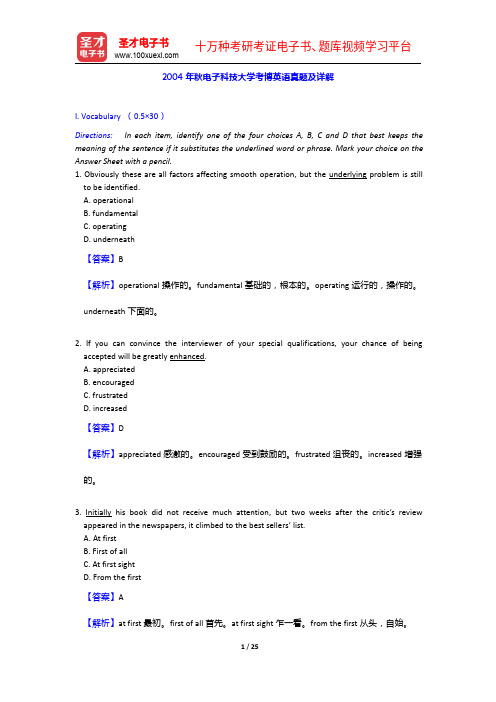
2004年秋电子科技大学考博英语真题及详解I.Vocabulary(0.5×30)Directions:In each item,identify one of the four choices A,B,C and D that best keeps the meaning of the sentence if it substitutes the underlined word or phrase.Mark your choice on the Answer Sheet with a pencil.1.Obviously these are all factors affecting smooth operation,but the underlying problem is still to be identified.A.operationalB.fundamentalC.operatingD.underneath【答案】B【解析】operational操作的。
fundamental基础的,根本的。
operating运行的,操作的。
underneath下面的。
2.If you can convince the interviewer of your special qualifications,your chance of being accepted will be greatly enhanced.A.appreciatedB.encouragedC.frustratedD.increased【答案】D【解析】appreciated感激的。
encouraged受到鼓励的。
frustrated沮丧的。
increased增强的。
3.Initially his book did not receive much attention,but two weeks after the critic’s review appeared in the newspapers,it climbed to the best sellers’list.A.At firstB.First of allC.At first sightD.From the first【答案】A【解析】at first最初。
2004 考研英语二真题及答案解析
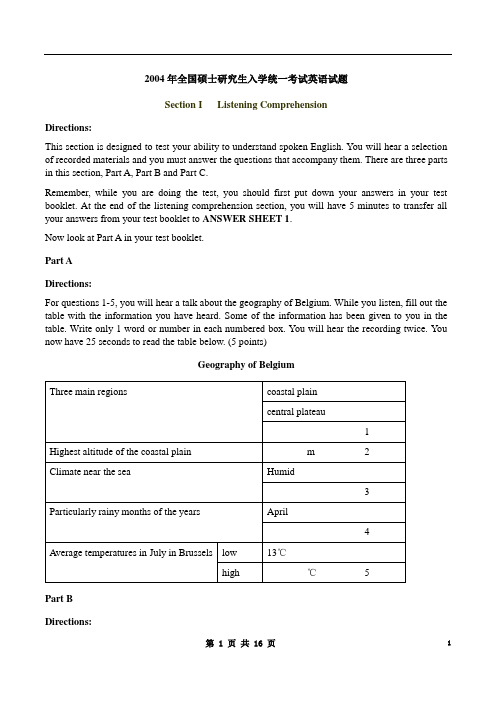
2004年全国硕士研究生入学统一考试英语试题Section I Listening ComprehensionDirections:This section is designed to test your ability to understand spoken English. You will hear a selection of recorded materials and you must answer the questions that accompany them. There are three parts in this section, Part A, Part B and Part C.Remember, while you are doing the test, you should first put down your answers in your test booklet. At the end of the listening comprehension section, you will have 5 minutes to transfer all your answers from your test booklet to ANSWER SHEET 1.Now look at Part A in your test booklet.Part ADirections:For questions 1-5, you will hear a talk about the geography of Belgium. While you listen, fill out the table with the information you have heard. Some of the information has been given to you in the table. Write only 1 word or number in each numbered box. You will hear the recording twice. You now have 25 seconds to read the table below. (5 points)Geography of BelgiumPart BDirections:For Questions 6-10, you will hear an interview with Mr. Saffo from the Institute for the Future. While you listen, complete the sentences or answer the questions. Use not more than 3 words for each answer. You will hear the recording twice. You now have 25 seconds to read the sentences and questions below. (5 points)What is Saffo according to himself?The Institute for the Future provides services to private companies and ________.The Institute believes that to think systematically about the long-range future is________.To succeed in anything, one should be flexible, curious and________.What does Saffo consider to be essential to the work of a team?Part CDirections:You will hear three pieces of recorded material. Before listening to each one, you will have time to read the questions related to it. While listening, answer each question by choosing [A], [B], [C] or[D]. After listening, you will have time to check your answers. You will hear each piece once only.(10 points)Questions 11-13 are based on the following talk about naming newborns. You now have 15 seconds to read Questions 11-13.11. What do we often do with the things we love?[A] Ask for their names.[B] Name babies after them.[C] Put down their names.[D] Choose names for them.12. The unpleasant meaning of an old family name is often overlooked if ________.[A] the family tree is fairly limited[B] the family tie is strong enough[C] the name is commonly used[D] nobody in the family complains13. Several months after a baby’s birth, its name will ________.[A] show the beauty of its own[B] develop more associations[C] lose the original meaning[D] help form the baby’s personalityQuestions 14-16 are based on the biography of Bobby Moore, an English soccer player. You now have 15 seconds to read Questions 14-16.14. How many matches did Moore play during his professional career?[A] 90[B] 108[C] 180[D] 66815. In 1964, Bobby Moore was made ________.[A] England’s footballer of the year[B] a soccer coach in West Germany[C] a medalist for his sportsmanship[D] a number of the Order of the British Empire16. After Moore retired from playing, the first thing he did was ________.[A] editing Sunday Sport[B] working for Capital Radio[C] managing professional soccer teams[D] developing a sports marketing companyQuestions 17-20 are based on the following talk on the city of Belfast. You now have 20 seconds to read Questions 17-20.17. Belfast has long been famous for its ________.[A] oil refinery[B] linen textiles[C] food products[D] deepwater port18. Which of the following does Belfast chiefly export?[A] Soap[B] Grain[C] Steel[D] Tobacco19. When was Belfast founded?[A] In 1177[B] In 1315[C] In the 16th century[D] In the 17th century20. What happened in Belfast in the late 18th century?[A] French refugees arrived.[B] The harbor was destroyed.[C] Shipbuilding began to flourish.[D] The city was taken by the English.You now have 5 minutes to transfer all your answers from your test booklet to ANSWER SHEET 1.Section II Use of EnglishDirections:Read the following text. Choose the best word (s) for each numbered blank and mark [A], [B], [C] or [D] on ANSWER SHEET 1. (10 points)Many theories concerning the causes of juvenile delinquency (crimes committed by young people) focus either on the individual or on society as the major contributing influence. Theories 21on the individual suggest that children engage in criminal behavior 22they were not sufficiently penalized for previous misdeeds or that they have learned criminal behavior through 23with others. Theories focusing on the role of society suggest that children commit crimesin 24to their failure to rise above their socioeconomic status, 25as a rejection of middle-class values.Most theories of juvenile delinquency have focused on children from disadvantaged families, 26the fact that children from wealthy homes also commit crimes. The latter may commit crimes 27lack of adequate parental control. All theories, however, are tentative and are 28to criticism.Changes in the social structure may indirectly 大29家juvenile crime rates. For example, changes in the economy that 30to fewer job opportunities for youth and rising unemployment 31make gainful employment increasingly difficult to obtain. The resulting discontent may in 32lead more youths into criminal behavior.Families have also 大33家changes these years. More families consist of one-parent households or two working parents; 大34家, children are likely to have less supervision at home 35was common in the traditional family 36. This lack of parental supervision is thought to be an influence on juvenile crime rates. Other 37causes of offensive acts include frustration or failure in school, the increased 38of drugs and alcohol, and the growing 39of child abuse and child neglect. All these conditions tend to increase the probability of a child committing a criminal act, 大40家 a direct causal relationship has not yet been established.21. [A] acting [B] relying [C] centering [D] commenting22. [A] before [B] unless [C] until [D] because23. [A] interaction [B] assimilation [C] cooperation [D] consultation24. [A] return [B] reply [C] reference [D] response25. [A] or [B] but rather [C] but [D] or else26. [A] considering [B] ignoring [C] highlighting [D] discarding27. [A] on [B] in [C] for [D] with28. [A] immune [B] resistant [C] sensitive [D] subject29. [A] affect [B] reduce [C] check [D] reflect30. [A] point [B] lead [C] come [D] amount31. [A] in general [B] on average [C] by contrast [D] at length32. [A] case [B] short [C] turn [D] essence33. [A] survived [B] noticed [C] undertaken [D] experienced34. [A] contrarily [B] consequently [C] similarly [D] simultaneously35. [A] than [B] that [C] which [D] as36. [A] system [B] structure [C] concept [D] heritage37. [A] assessable [B] identifiable [C] negligible [D] incredible38. [A] expense [B] restriction [C] allocation [D] availability39. [A] incidence [B] awareness [C] exposure [D] popularity40. [A] provide [B] since [C] although [D] supposingSection III Reading ComprehensionPart ADirections:Read the following four texts. Answer the questions below each text by choosing [A], [B], [C] or [D]. Mark your answers on ANSWER SHEET 1. (40 points)Text 1Hunting for a job late last year, lawyer Gant Redmon stumbled across CareerBuilder, a job database on the Internet. He searched it with no success but was attracted by the site’s “personal search agent.” It’s an interactive feature that lets visitors key in job criteria suc h as location, title, and salary, then E-mails them when a matching position is posted in the database. Redmon chose the keywords legal, intellectual property, and Washington, D.C. Three weeks later, he got his first notification of an opening. “I struck gold,” says Redmon, who E-mailed his resume to the employer and won a position as in-house counsel for a company.With thousands of career-related sites on the Internet, finding promising openings can be time-consuming and inefficient. Search agents reduce the need for repeated visits to the databases. But although a search agent worked for Redmon, career experts see drawbacks. Narrowing your criteria, for example, may work against you: “Every time you answer a question you eliminate a possibility.” says one expert.For any job search, you should start with a narrow concept—what you think you want to do -- then broaden it. “None of these programs do that,” says another expert. “There’s no career counseling implicit in all of this.” Instead, the best strategy is to use the agent as a kind of tip service to keep abreast of jobs in a particular database; when you get E-mail, consider it a reminderto check the database again. “I would not rely on agents for finding everything that is added to a database that migh t interest me,” says the author of a job-searching guide.Some sites design their agents to tempt job hunters to return. When CareerSite’s agent sends out messages to those who have signed up for its service, for example, it includes only three potential jobs -- those it considers the best matches. There may be more matches in the database; job hunters will have to visit the site again to find them -- and they do. “On the day after we send our messages, we see a sharp increase in our traffic,” says Seth Pee ts, vice president of marketing for CareerSite.Even those who aren’t hunting for jobs may find search agents worthwhile. Some use them to keep a close watch on the demand for their line of work or gather information on compensation to arm themselves when negotiating for a raise. Although happily employed, Redmon maintains his agent at CareerBuilder. “You always keep your eyes open,” he says. Working with a personal search agent means having another set of eyes looking out for you.41. How did Redmon find his job?[A] By searching openings in a job database.[B] By posting a matching position in a database.[C] By using a special service of a database.[D] By E-mailing his resume to a database.42. Which of the following can be a disadvantage of search agents?[A] Lack of counseling.[B] Limited number of visits.[C] Lower efficiency.[D] Fewer successful matches.43. The expression “tip service” (Line 4, Paragraph 3) most probably means ________.[A] advisory[B] compensation[C] interaction[D] reminder44. Why does CareerSite’s agent offer each job hunter only three job options?[A] To focus on better job matches.[B] To attract more returning visits.[C] To reserve space for more messages.[D] To increase the rate of success.45. Which of the following is true according to the text?[A] Personal search agents are indispensable to job-hunters.[B] Some sites keep E-mailing job seekers to trace their demands.[C] Personal search agents are also helpful to those already employed.[D] Some agents stop sending information to people once they are employed.Text 2Over the past century, all kinds of unfairness and discrimination have been condemned or made illegal. But one insidious form continues to thrive: alphabetism. This, for those as yet unaware of such a disadvantage, refers to discrimination against those whose surnames begin with a letter in the lower half of the alphabet.It has long been known that a taxi firm called AAAA cars has a big advantage over Zodiac cars when customers thumb through their phone directories. Less well known is the advantage that Adam Abbott has in life over Zoë Zysman. English names are fairly evenly spread between the halves of the alphabet. Yet a suspiciously large number of top people have surnames beginning with letters between A and K.Thus the American president and vice-president have surnames starting with B and C respectively; and 26 of George Bush’s predecessors (including his father) had surnames in the first half of the alphabet against just 16 in the second half. Even more striking, six of the seven heads of government of the G7 rich countries are alphabetically advantaged (Berlusconi, Blair, Bush, Chirac, Chrétien and Koizumi). The world’s three top central bankers (Greenspan, Duisenberg and Hayami) are all close to the top of the alphabet, even if one of them really uses Japanese characters. As are the world’s five richest men (Gates, Buffett, Allen, Ellison and Albrecht).Can this merely be coincidence? One theory, dreamt up in all the spare time enjoyed by the alphabetically disadvantaged, is that the rot sets in early. At the start of the first year in infant school, teachers seat pupils alphabetically from the front, to make it easier to remember their names. So short-sighted Zysman junior gets stuck in the back row, and is rarely asked the improving questions posed by those insensitive teachers. At the time the alphabetically disadvantaged may think they have had a lucky escape. Yet the result may be worse qualifications, because they get less individual attention, as well as less confidence in speaking publicly.The humiliation continues. At university graduation ceremonies, the ABCs proudly get their awards first; by the time they reach the Zysmans most people are literally having a ZZZ. Shortlists for job interviews, election ballot papers, lists of conference speakers and attendees: all tend to be drawn up alphabetically, and their recipients lose interest as they plough through them.46. What does the author intend to illustrate with AAA A cars and Zodiac cars?[A] A kind of overlooked inequality.[B] A type of conspicuous bias.[C] A type of personal prejudice.[D] A kind of brand discrimination.47. What can we infer from the first three paragraphs?[A] In both East and West, names are essential to success.[B] The alphabet is to blame for the failure of Zoë Zysman.[C] Customers often pay a lot of attention to companies’ names.[D] Some form of discrimination is too subtle to recognize.48. The 4th paragraph suggests that ________.[A] questions are often put to the more intelligent students[B] alphabetically disadvantaged students often escape from class[C] teachers should pay attention to all of their students[D] students should be seated according to their eyesight49. What does the a uthor mean by “most people are literally having a ZZZ” (Lines 2-3, Paragraph5)?[A] They are getting impatient.[B] They are noisily dozing off.[C] They are feeling humiliated.[D] They are busy with word puzzles.50. Which of the following is true according to the text?[A] People with surnames beginning with N to Z are often ill-treated.[B] VIPs in the Western world gain a great deal from alphabetism.[C] The campaign to eliminate alphabetism still has a long way to go.[D] Putting things alphabetically may lead to unintentional bias.Text 3When it comes to the slowing economy, Ellen Spero isn’t biting her nails just yet. But the 47-year-old manicurist isn’t cutting, fi l ling or polishing as many nails as she’d like to, either. Most of her clients spend $12 to $50 weekly, but last month two longtime customers suddenly stopped showing up. Spero blames the softening economy. “I’m a good economic indicator,” she says. “I provide a service that people can do without when they’re concerned about saving some dollars.” So Spero is downscaling, shopping at middle-brow Dillard’s department store near her suburban Cleveland home, instead of Neiman Marcus. “I don’t know if other clients are going to abandon me, too.” she says.Even before Alan Greenspan’s admission that America’s red-hot economy is cooling, lots of working folks had already seen signs of the slowdown themselves. From car dealerships to Gap outlets, sales have been lagging for months as shoppers temper their spending. For retailers, who last year took in 24 percent of their revenue between Thanksgiving and Christmas, the cautious approach is coming at a crucial time. Already, experts say, holiday sales are off 7 percent from last year’s pace. But don’t sound any alarms just yet. Consumers seem on ly mildly concerned, notpanicked, and many say they remain optimistic about the economy’s long-term prospects, even as they do some modest belt-tightening.Consumers say they’re not in despair because, despite the dreadful headlines, their own fortunes still feel pretty good. Home prices are holding steady in most regions. In Manhattan, “there’s a new gold rush happening in the $4 million to $10 million range, predominantly fed by Wall Street bonuses,” says broker Barbara Corcoran. In San Francisco, prices are still rising even as frenzied overbidding quiets. “Instead of 20 to 30 offers, now maybe you only get two or three,” says John Tealdi, a Bay Area real-estate broker. And most folks still feel pretty comfortable about their ability to find and keep a job.Many folks see silver linings to this slowdown. Potential home buyers would cheer for lower interest rates. Employers wouldn’t mind a little fewer bubbles in the job market. Many consumers seem to have been influenced by stock-market swings, which investors now view as a necessary ingredient to a sustained boom. Diners might see an upside, too. Getting a table at Manhattan’s hot new Alain Ducasse restaurant used to be impossible. Not anymore. For that, Greenspan & Co. may still be worth toasting.51. By “Ellen Spero isn’t biting her nails just yet” (Line s 1-2, Paragraph 1), the author means________.[A] Spero can hardly maintain her business[B] Spero is too much engaged in her work[C] Spero has grown out of her bad habit[D] Spero is not in a desperate situation52. How do the public feel about the current economic situation?[A] Optimistic.[B] Confused.[C] Carefree.[D] Panicked.53. When mentioning “the $4 million to $10 million range” (Lines 3-4, Paragraph 3) the author istalking about ________.[A] gold market[B] real estate[C] stock exchange[D] venture investment54. Why can many people see “silver linings” to the economic s lowdown?[A] They would benefit in certain ways.[B] The stock market shows signs of recovery.[C] Such a slowdown usually precedes a boom.[D] The purchasing power would be enhanced.55. To which of the following is the author likely to agree?[A] A new boom, on the horizon.[B] Tighten the belt, the single remedy.[C] Caution all right, panic not.[D] The more ventures, the more chances.Text 4Americans today don’t place a very high value on intellect. Our heroes are athletes, entertainers, and entrepreneurs, not scholars. Even our schools are where we send our children to get a practical education -- not to pursue knowledge for the sake of knowledge. Symptoms of pervasive anti-intellectualism in our schools aren’t difficult to find.“Schools have always been in a society where practical is more important than intellectual,” says education writer Diane Ravit ch. “Schools could be a counterbalance.” Ra v itch’s latest bo ok, Left Back: A Century of Failed School Reforms, traces the roots of anti-intellectualism in our schools, concluding they are anything but a counterbalance to the American distaste for intellectual pursuits.But they could and should be. Encouraging kids to reject the life of the mind leaves them vulnerable to exploitation and control. Without the ability to think critically, to defend their ideas and understand the ideas of others, they cannot fully participate in our democracy. Continuing along this path, says writer Earl Shorris, “We will become a second-rate country. We will have a less civil society.”“Intellect is resented as a form of power or privilege,” writes historian and professor Ric hard Hofstadter in Anti-Intellectualism in American Life, a Pulitzer-Prize winning book on the roots of anti-intellectualism in US politics, religion, and education. From the beginning of our history, says Hofstadter, our democratic and populist urges have driven us to reject anything that smells of elitism. Practicality, common sense, and native intelligence have been considered more noble qualities than anything you could learn from a book.Ralph Waldo Emerson and other Transcendentalist philosophers thought schooling and rigorous book learning put unnatural restraints on children: “We are shut up in schools and college recitation rooms for 10 or 15 years and come out at last with a bellyful of words and do not know a thing.” Mark Twain’s Huckleberry Finn exemplified American anti-intellectualism. Its hero avoids being civilized -- going to school and learning to read -- so he can preserve his innate goodness.Intellect, according to Hofstadter, is different from native intelligence, a quality we reluctantly admire. Intellect is the critical, creative, and contemplative side of the mind. Intelligence seeks to grasp, manipulate, re-order, and adjust, while intellect examines, ponders, wonders, theorizes, criticizes and imagines.School remains a place where i ntellect is mistrusted. Hofstadter says our country’s educational system is in the grips of people who “joyfully and militantly proclaim their hostility to intellect and their eagerness to identify with children who show the least intellectual promise.”56. What do American parents expect their children to acquire in school?[A] The habit of thinking independently.[B] Profound knowledge of the world.[C] Practical abilities for future career.[D] The confidence in intellectual pursuits.57. We can learn from the text that Americans have a history of ________.[A] undervaluing intellect[B] favoring intellectualism[C] supporting school reform[D] suppressing native intelligence58. The views of Ravitch and Emerson on schooling are ________.[A] identical[B] similar[C] complementary[D] opposite59. Emerson, according to the text, is probably ________.[A] a pioneer of education reform[B] an opponent of intellectualism[C] a scholar in favor of intellect[D] an advocate of regular schooling60. What does the author think of intellect?[A] It is second to intelligence.[B] It evolves from common sense.[C] It is to be pursued.[D] It underlies power.Part BDirections:Read the following text carefully and then translate the underlined segments into Chinese. Your translation should be written clearly on ANSWER SHEET 2. (10 points)The relation of language and mind has interested philosophers for many centuries. 61) The Greeks assumed that the structure of language had some connection with the process of thought, which took root in Europe long before people realized how diverse languages could be.Only recently did linguists begin the serious study of languages that were very different from their own. Two anthropologist-linguists, Franz Boas and Edward Sapir, were pioneers in describing many native languages of North and South America during the first half of the twentieth century. 62) We are obliged to them because some of these languages have since vanished, as the peoples who spoke them died out or became assimilated and lost their native languages. Other linguists in the earlier part of this century, however, who were less eager to deal with bizarre data from “exotic” language, were not always so grateful. 63) The newly described languages were often so strikingly different from the well studied languages of Europe and Southeast Asia that some scholars even accused Boas and Sapir of fabricating their data. Native American languages are indeed different, so much so in fact that Navajo could be used by the US military as a code during World War II to send secret messages.Sapir’s pupil, Benjamin Lee Whorf, continued the study of American Indian languages. 64) Being interested in the relationship of language and thought, Whorf developed the idea that the structure of language determines the structure of habitual thought in a society. He reasoned that because it is easier to formulate certain concepts and not others in a given language, the speakers of that language think along one track and not along another. 65) Whorf came to believe in a sort of linguistic determinism which, in its strongest form, states that language imprisons the mind, and that the grammatical patterns in a language can produce far-reaching consequences for the culture of a society. Later, this idea became to be known as the Sapir-Whorf hypothesis, but this term is somewhat inappropriate. Although both Sapir and Whorf emphasized the diversity of languages, Sapir himself never explicitly supported the notion of linguistic determinism.61. ________62. ________63. ________64. ________65. ________Section IV Writing66. Directions:Study the following drawing carefully and write an essay in which you should1) describe the drawing,2) interpret its meaning, and3) support your view with examples.You should write about 200 words neatly on ANSWER SHEET 2. (20 points)2004年考研英语真题答案Section I: Listening Comprehension (20 points)Part A (5 points)Part B (5 points)6. A (technology) forecaster;7. government agencies;8. (A) meaningful (exercise);9. open to change;10. Trust and cooperation.Part C (10 points)Section II: Use of English (10 points)Section III: Reading Comprehension (50 points)Part A (40 points)Part B (10 points)61. 希腊人认为, 语言结构与思维过程之间存在着某种联系。
电子科技大学 电子科大2004年管理学 考研真题及答案解析
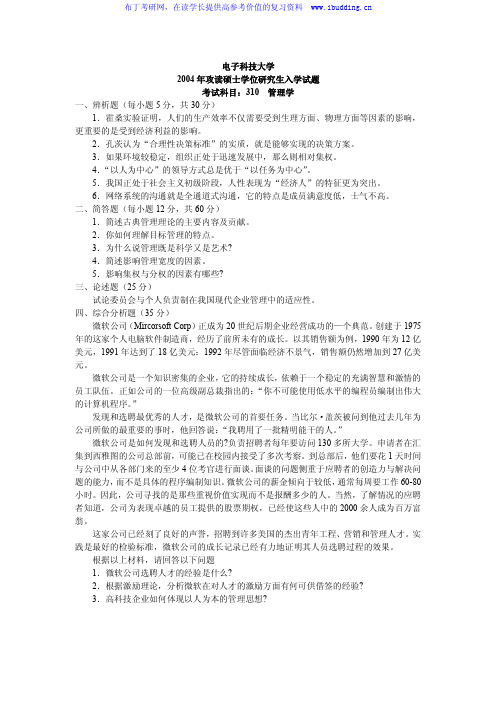
电子科技大学2004年攻读硕士学位研究生入学试题考试科目:310管理学一、辨析题(每小题5分,共30分)1.霍桑实验证明,人们的生产效率不仅需要受到生理方面、物理方面等因素的影响,更重要的是受到经济利益的影响。
2.孔茨认为“合理性决策标准”的实质,就是能够实现的决策方案。
3.如果环境较稳定,组织正处于迅速发展中,那么则相对集权。
4.“以人为中心”的领导方式总是优于“以任务为中心”。
5.我国正处于社会主义初级阶段,人性表现为“经济人”的特征更为突出。
6.网络系统的沟通就是全通道式沟通,它的特点是成员满意度低,士气不高。
二、简答题(每小题12分,共60分)1.简述古典管理理论的主要内容及贡献。
2.你如何理解目标管理的特点。
3.为什么说管理既是科学又是艺术?4.简述影响管理宽度的因素。
5.影响集权与分权的因素有哪些?三、论述题(25分)试论委员会与个人负责制在我国现代企业管理中的适应性。
四、综合分析题(35分)微软公司(Mircorsoft Corp)正成为20世纪后期企业经营成功的—个典范。
创建于1975年的这家个人电脑软件制造商,经历了前所未有的成长。
以其销售额为例,1990年为12亿美元,1991年达到了18亿美元:1992年尽管面临经济不景气,销售额仍然增加到27亿美元。
微软公司是一个知识密集的企业,它的持续成长,依赖于一个稳定的充满智慧和激情的员工队伍。
正如公司的一位高级副总裁指出的:“你不可能使用低水平的编程员编制出伟大的计算机程序。
”发现和选聘最优秀的人才,是微软公司的首要任务。
当比尔·盖茨被问到他过去几年为公司所做的最重要的事时,他回答说:“我聘用了一批精明能干的人。
”微软公司是如何发现和选聘人员的?负责招聘者每年要访问130多所大学。
申请者在汇集到西雅图的公司总部前,可能已在校园内接受了多次考察。
到总部后,他们要花1天时间与公司中从各部门来的至少4位考官进行面谈。
面谈的问题侧重于应聘者的创造力与解决问题的能力,而不是具体的程序编制知识。
2004考研英语真题(英一二通用)答案+解析
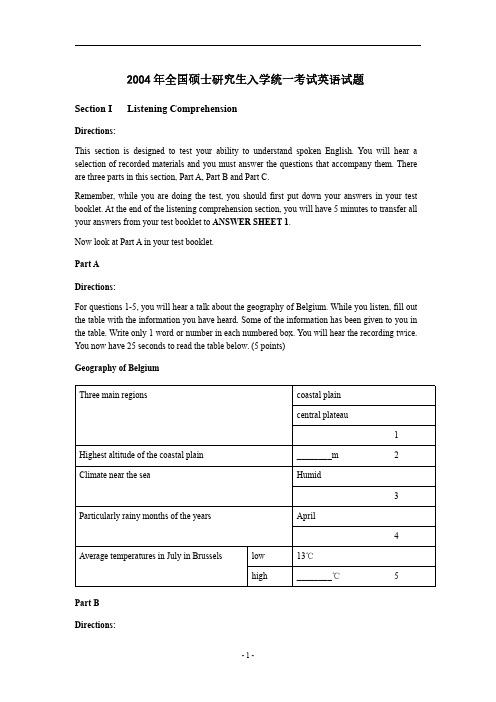
13. Several months after a baby’s birth, its name will ________. [A] show the beauty of its own [B] develop more associations [C] lose the original meaning [D] help form the baby’s personality
Now look at Part A in your test booklet.
Part A
Directions:
For questions 1-5, you will hear a talk about the geography of Belgium. While you listen, fill out the table with the information you have heard. Some of the information has been given to you in the table. Write only 1 word or number in each numbered box. You will hear the recording twice. You now have 25 seconds to read the table below. (5 points)
commit crimes in 大 24 家 to their failure to rise above their socioeconomic status,
大 25 家 as a rejection of middle-class values. Most theories of juvenile delinquency have focused on children from disadvantaged
2004专四真题及答案详解TEM4word文本
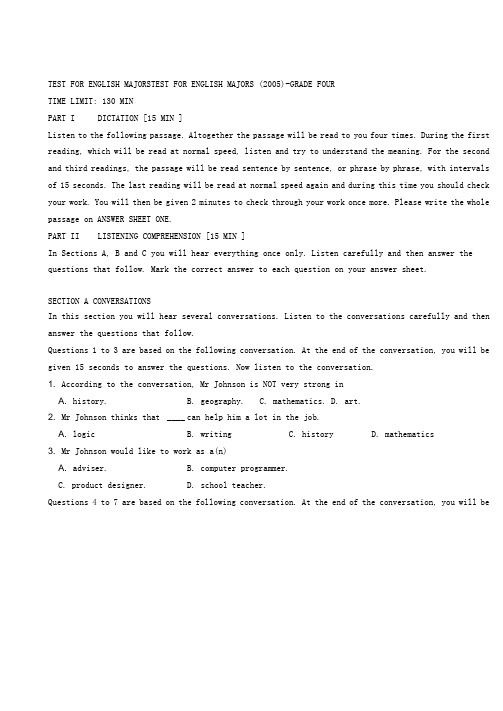
TEST FOR ENGLISH MAJORSTEST FOR ENGLISH MAJORS (2005)-GRADE FOURTIME LIMIT: 130 MINPART I DICTATION [15 MIN ]Listen to the following passage. Altogether the passage will be read to you four times. During the first reading, which will be read at normal speed, listen and try to understand the meaning. For the second and third readings, the passage will be read sentence by sentence, or phrase by phrase, with intervals of 15 seconds. The last reading will be read at normal speed again and during this time you should check your work. You will then be given 2 minutes to check through your work once more. Please write the whole passage on ANSWER SHEET ONE.PART II LISTENING COMPREHENSION [15 MIN ]In Sections A, B and C you will hear everything once only. Listen carefully and then answer the questions that follow. Mark the correct answer to each question on your answer sheet.SECTION A CONVERSATIONSIn this section you will hear several conversations. Listen to the conversations carefully and then answer the questions that follow.Questions 1 to 3 are based on the following conversation. At the end of the conversation, you will be given 15 seconds to answer the questions. Now listen to the conversation.1. According to the conversation, Mr Johnson is NOT very strong inA. history.B. geography.C. mathematics.D. art.2. Mr Johnson thinks that ____ can help him a lot in the job.A. logicB. writingC. historyD. mathematics3. Mr Johnson would like to work as a(n)A. adviser.B. computer programmer.C. product designer.D. school teacher.Questions 4 to 7 are based on the following conversation. At the end of the conversation, you will be4. What is the main purpose of the research?A. To make preparations for a new publication.C. To know how housework is shared.5. What does the man do on Fridays?A. He goes to exercise classes.C. He goes to the cinema.6. On which day does the couple always go out?A. Friday.B. Saturday.7. Which personal detail does the man give?A. Surname.B. First name.B. To learn how couples spend their weekends.D. To investigate what people do at the weekend.B. He goes sailing.D. He stays at home.C. Sunday.D. Any weekday.C. Address.D. Age.B. The train to Zhengzhou.D. The train to Hangzhou.given 20 seconds to answer the questions. Now listen to the conversation. Questions 8 to 10 are based on the following conversation. At the end of the conversation, you will be given 15 seconds to answerthe questions. Now listen to the conversation.8. Parcel Express needs the following details about the sender EXCEPTA. name.B. address.C. receipt.D. phone number.9. Parcels must be left open mainly forA. customs 'check.B. security check.C. convenience 's saDk.et.he company 's sake.10. The woman 's last inquiry is mayincloncerned withA. the time needed for sending the parcel.B. the flight time to New York.C. the parcel destination.D. parcel collection. SECTION B PASSAGESIn this section, you will hear several passages. Listen to the passages carefully and then answer the questions that follow.Questions 11 to 13 are based on the following passage. At the end of the passage, you will be given 15 seconds to answer the questions. Now listen to the passage.11. Where is the train to Nanjing now standing?A. At Platform 7.B. At Platform 8.C. At Platform 9.D. At Platform 13.12. Which train will now leave at 11:35?A. The train to Jinnan.C. The train to Tianjin.13. Which train has now been cancelled?A. The train to Jinnan.B. The train to Zhengzhou.C. The train to Tianjin.D. The train to Hangzhou.Questions 14 to 17 are based on the following passage. At the end of the passage, you will be given 20 seconds to answer the questions. Now listen to the passage.14. The museum was built in memory of those A. who died in wars.C. who lost their families in disasters.15. Henry Durant put forward the idea because he A. had once fought in a war in Italy.C. had assisted in treating the wounded.B. who worked to help victims. D. who fought in wars.B. had been wounded in a war.D. had seen the casualties and cruelties of war.A. It is just a lot of cheering.B. It mainly involves yelling.16. Which of the following statements about the symbols is INCORRECT? A. Both are used as the organizati on 's official symbols. B. Both are used regardless of religious significance. C. The red cross was the organization's original symbol.D. The red crescent was later adopted for use in certain regions. 17. How should cheerleading be viewed according to the passage?C. It mainly involves dancing.D. It is competitive in nature.Questions 18 to 20 are based on the following passage. At the end of the passage, you will be given 15 seconds to answer the questions. Now listen to the passage. 18. How do the cheerleaders perform their jobs? A. They set fireworks for their team. B. They put on athletic shows. C. They run around the spectators.D. They yell for people to buy drinks.19. Why do the cheerleaders sometimes suffer physical injuries? A. Because they try dangerous acts to catch people's attention.B. Because they shout and yell so their voice becomes hoarse.C. Because they go to the pyramid and the hills to perform.D. Because they dance too much every day for practice. 20. Which of the following statements is NOT true?A. The first cheerleaders was a man named John Campbell.B. Cheerleaders 'contests are only held at the state level.C. Before 1930 there were no women cheerleaders.D. The first cheerleading occurred in 1898. SECTION C NEWS BROAOCASTQuestions 21 to 22 are based on the following news. At the end of the news item, you will be given 10 seconds to answer the questions. Now listen to the news.21. How many of the emigrants died after being thrown into the sea? A. 15 of them.B. 3 of them.C. 100 of them.D. Dozens of them.22. The illegal emigrants came fromA. Italy.B. Africa.C. the Mediterranean region.D. places unknown. Question 23 is based on the following news. At the end of the news item, you will be given 5 seconds to answer the question. Now listen to the news.23. What does the news item mainly report?A. China will send three people into space in a week.B. Three Chinese astronauts will spend a week in space.C. The Shenzhou VI will be launched next year.D. Shenzhou V circled the earth for two days.Questions 24 and 25 are based on the following news. At the end of the news item, you will be given 10 seconds to answer the questions. Now listen to the news.24. Which of the following had NOT been affected by the wildfires?A. Houses.B. Land.C. Skies.D. Cars.25. The fires were thought to have been startedA. purposefully.B. accidentally.C. on the Mexican border.D. in southern California.Questions 26 to 28 are based on the following news. At the end of the news item, you will be given 15 seconds to answer the question. Now listen to the news.26. _______ r anks second among leading tourism nations.A. FranceB. The United StatesC. SpainD. Italy27. It is predicted that by 2020 China will receive visitors.A. 77 millionB. 130 millionC. 36.8 millionD. 100 million28. According to a Xinhua report, last year saw a ______ per cent increase in the number of Chinese traveling abroad.A. 16.6B. 30C. 100D. 37Question 29 and 30 are based on the following news. At the end of the news item, you will be given 10 seconds to answer the question. Now listen to the news.29. What would happen to the Argentine officers?A. They would be arrested by Spanish authorities.B. They would be tried in an Argentine court.C. They would be sent to Spain for trial.D. They would be tortured or murdered.30. What accusation would the Argentine officers face?A. Violation of human rights.B. Involvement in illegal actions.C. Planning anti-government activities.D. Being part of the military rule.PART III CLOZE [15 MIN. ]Decide which of the choices given below would best complete the passage if inserted in the corresponding blanks. Mark the best choice for each blank on your answer sheet.A person 's home is as much a reflection of his personality as the clothes he wears, the food he eats and the friends with whom he spends his time. Depending on personality, most have in mind a(n) “ (31) __________ home ” . But in general, and especially for the student or new wage earners, there are practical (32) _____ o f cash and location on achieving that idea.Cash (33) _______ , in fact, often means that the only way of (34) _ when you leaveschool is to stay at home for a while until things (35) financially. There are obvious (36) of living at home—personal laundry is usually (37) done along with the family wash; meals are provided and there will be a well-established circle of friends to (38) . And there is (39) the responsibility for paying bills, rates, etc. On the other hand, (40) depends on how a family gets on. Do your parents like your friends? Youmay love your family —(41) ____ do you like them? Are you prepared to be (42) ______when your parents ask where you are going in the evening and what time you expect to be back? If you find that you cannot manage a(n) (43) ________ , and that you finally have the money to leave,how do you (44) ________ finding somewhere else to live? If you plan to stay in your home area, the possibilities are (45) ___ well-known to you already. Friends and the local paper are always (46) _________ . If you are going to work in a (47) ________ area, again there are the papers—and the accommodation agencies, (48) ______ t hese should be approached with (49)_________ . Agencies are allowed to charge a fee, usually the (50) of the first week if you take accommodation they have found for you.31. A. ideal B. perfect C. imaginary D. satisfactory32. A. deficiencies B. weaknesses C. insufficiencies D. limitations33. A. cut B. shortage C. lack D. drain34. A. getting over B. getting in C. getting back D. getting along35. A. improve B. enhance C. develop D. proceed36. A. concerns B. issues C. advantages D. problems37. A. still B. always C. habitually D. consequently38. A. call in B. call over C. call upon D. call out39. A. always B. rarely C. little D. sometimes40. A. little B. enough C. many D. much41. A. and B. but C. still D. or42. A. tolerant B. hostile C. indifferent D. good-tempered43. A. agreement B. consensus C. compromise D. deal44. A. go about B. go over C. go in for D. go through45. A. seldom B. less C. probably D. certainly46. A. dependent B. a good source of informationC. of great valueD. reliable47. A. familiar B. cold C. humid D. new48. A. though B. while C. since D. as49. A. enthusiasm B. hesitation C. caution D. concern50. A. same B. equivalent C. equal D. similarityPART IV GRAMMAR &VOCABULARY [15 MIN ]There are thirty sentences in this section. Beneath each sentence there are four words or phrases marked A, B, C and D. Choose one word or phrase that best completes the sentence. Mark your answers on your answer sheet51. If you explained the situation to your solicitor, he able to advise you much better thanI can.A. would beB. will have beenC. wasD. were52. ________ , Mr. Wells is scarcely in sympathy with the working class.A. Although he is a socialistB. Even if he is a socialist。
2004年高考英语全国卷IV听力试题暨听力原文

2004年高考英语全国卷IV听力试题暨听力原文第一部分听力理解(共两节,满分30分)第一节(共5小题,每小题1.5分,满分7.5分)听下面5段对话。
每段对话后有一个小题,从题中所给的A、B、C三个选项中选出最佳选项,并标在试卷的相应位置。
听完每段对话后,你都有10秒钟的时间来回答有关小题和阅读下一小题。
每段对话仅读一遍。
1. What does the man mean?A. He wants to know the time.B. He offers to give a lecture.C. He agrees to help the woman.2. What will the man probably do after the conversation?A. Wait there.B. Find a seat.C. Sit down.3. Who are the speakers talking about?A. An actor.B. A writer.C. A tennis player.4. Where does the conversation most probably take place?A. On a farm.B. In a restaurant.C. In a market.5. What does the man agree to do after a while?A. Take a break.B. Talk about his troubles.C. Meet some friends.第二节(共15小题;每小题1.5分,满分22.5分)听下面5段对话或独白。
每段对话或独白后有几个小题,从题中所给的A、B、C三个选项中选出最佳选项,并标在试卷的相应位置。
听每段对话或独白前,你将有时间阅读各个小题,每小题5秒钟;听完后,各小题将给出5秒钟的作答时间。
每段对话或独白读两遍。
2004年考研英语真题及答案

2004年全国硕士研究生入学统一考试英语试题Section I: Listening ComprehensionDirections:This section is designed to test your ability to understand spoken English. You will hear a selection of recorded materials and you must answer the questions that accompany them. There are three parts in this section, Part A, Part B and Part C.Remember, while you are doing the test, you should first put down your answers in your test booklet. At the end of the listening comprehension section, you will have 5 minutes to transfer all your answers from your test booklet to ANSWER SHEET 1.Now look at Part A in your test booklet.Part ADirections:For questions 1-5, you will hear a talk about the geography of Belgium. While you listen, fill out the table with the information you have heard. Some of the information has been given to you in the table. Write only 1 word or number in each numbered box. You will hear the recording twice. You now have 25 seconds to read the table below. (5 points)Geography of BelgiumThree main regions coastal plaincentral plateau1Highest altitude of the coastal plain________m2Climate near the sea humid3Particularly rainy months of the years April4Average temperatures in July in Brussels low 13 ℃high________℃5Part BDirections:For Questions 6-10, you will hear an interview with Mr. Saffo from the Institute for the Future. While you listen, complete the sentences or answer the questions. Use not more than 3 words for each answer. You will hear the recording twice. You now have 25 seconds to read the sentences and questions below. (5 points)What is Saffo according to himself?The Institute for the Future provides services to private companies and ________.The Institute believes that to think systematically about the long-range future is________.To succeed in anything, one should be flexible, curious and________.What does Saffo consider to be essential to the work of a team?678910Part CDirections:You will hear three pieces of recorded material. Before listening to each one, you will have time to read the questions related to it. While listening, answer each question by choosing [A], [B], [C] or[D]. After listening, you will have time to check your answers. You will hear each piece once only.(10 points)Questions 11-13 are based on the following talk about naming newborns. You now have 15 seconds to read Questions 11-13.11.What do we often do with the things we love?[A] Ask for their names.[B] Name babies after them.[C] Put down their names.[D] Choose names for them.12.The unpleasant meaning of an old family name is often overlooked if ________.[A] the family tree is fairly limited[B] the family tie is strong enough[C] the name is commonly used[D] nobody in the family complains13.Several months after a baby’s birth, its name will ________.[A] show the beauty of its own[B] develop more associations[C] lose the original meaning[D] help form the baby’s personalityQuestions 14-16 are based on the biography of Bobby Moore, an English soccer player. You now have 15 seconds to read Questions 14-16.14.How many matches did Moore play during his professional career?[A] 90[B] 108[C] 180[D] 66815.In 1964, Bobby Moore was made ________.[A] England’s footballer of the year[B] a soccer coach in West Germany[C] a medalist for his sportsmanship[D] a number of the Order of the British Empire16.After Moore retired from playing, the first thing he did was ________.[A] editing Sunday Sport[B] working for Capital Radio[C] managing professional soccer teams[D] developing a sports marketing companyQuestions 17-20 are based on the following talk on the city of Belfast. You now have 20 seconds to read Questions 17-20.17.Belfast has long been famous for its ________.[A] oil refinery[B] linen textiles[C] food products[D] deepwater port18.Which of the following does Belfast chiefly export?[A] Soap[B] Grain[C] Steel[D] Tobacco19.When was Belfast founded?[A] In 1177[B] In 1315[C] In the 16th century[D] In the 17th century20.What happened in Belfast in the late 18th century?[A] French refugees arrived.[B] The harbor was destroyed.[C] Shipbuilding began to flourish.[D] The city was taken by the English.You now have 5 minutes to transfer all your answers from your test booklet to ANSWER SHEET 1.Section II: Use of EnglishDirections:Read the following text. Choose the best word (s) for each numbered blank and mark [A], [B], [C] or [D] on ANSWER SHEET 1. (10 points)Many theories concerning the causes of juvenile delinquency (crimes committed by young people) focus either on the individual or on society as the major contributing influence. Theories __21__ on the individual suggest that children engage in criminal behavior __22__ they were not sufficiently penalized for previous misdeeds or that they have learned criminal behavior through __23__ with others. Theories focusing on the role of society suggest that children commit crimes in __24__ to their failure to rise above their socioeconomic status, __25__ as a rejection of middle-class values. Most theories of juvenile delinquency have focused on children from disadvantaged families, __26__ the fact that children from wealthy homes also commit crimes. The latter may commit crimes __27__ lack of adequate parental control. All theories, however, are tentative and are __28__ to criticism.Changes in the social structure may indirectly __29__ juvenile crime rates. For example, changes in the economy that __30__ to fewer job opportunities for youth and rising unemployment __31__ make gainful employment increasingly difficult to obtain. The resulting discontent may in __32__ lead more youths into criminal behavior.Families have also __33__ changes these years. More families consist of one parent households or two working parents; __34__, children are likely to have less supervision at home __35__ was common in the traditional family __36__. This lack of parental supervision is thought to be an influence on juvenile crime rates. Other __37__ causes of offensive acts include frustration or failure in school, the increased __38__ of drugs and alcohol, and the growing __39__ of child abuse and child neglect. All these conditions tend to increase the probability of a child committing a criminal act, __40__ a direct causal relationship has not yet been established.21.[A] acting[B] relying[C] centering[D] cementing22.[A] before[B] unless[C] until[D] because23.[A] interactions[B] assimilation[C] cooperation[D] consultation24.[A] return[B] reply[C] reference[D] response25.[A] or[B] but rather[C] but[D] or else26.[A] considering[B] ignoring[C] highlighting[D] discarding27.[A] on[B] in[C] for[D] with28.[A] immune[B] resistant[C] sensitive[D] subject29.[A] affect[C] chock[D] reflect30.[A] point[B] lead[C] come[D] amount31.[A] in general[B] on average[C] by contrast[D] at length32.[A] case[B] short[C] turn[D] essence33.[A] survived[B] noticed[C] undertaken[D] experienced34.[A] contrarily[B] consequently[C] similarly[D] simultaneously35.[A] than[B] that[C] which[D] as36.[A] system[B] structure[C] concept[D] heritage37.[A] assessable[B] identifiable[C] negligible[D] incredible38.[A] expense[B] restriction[C] allocation[D] availability39.[A] incidence[B] awareness[C] exposure[D] popularity40.[A] provided[C] although[D] supposingSection III: Reading ComprehensionPart ADirections:Read the following four texts. Answer the questions below each text by choosing [A], [B], [C] or [D] Mark your mowers on ANSWER SHEET 1. (40 points)Text 1Hunting for a job late last year, lawyer Gant Redmon stumbled across CareerBuilder, a job database on the Internet. He searched it with no success but was attracted by the site’s “personal search agent.” It’s an interactive feature that lets visitors key in job criteria such as location, title, and salary, then E-mails them when a matching position is posted in the database. Redmon chose the keywords legal, intellectual property, and Washington, D.C. Three weeks later, he got his first notification of an opening. “I struck gold,” says Redmon, who E-mailed his resume to the employer and won a position as in-house counsel for a company.With thousands of career-related sites on the Internet, finding promising openings can be time-consuming and inefficient. Search agents reduce the need for repeated visits to the databases. But although a search agent worked for Redmon, career experts see drawbacks. Narrowing your criteria, for example, may work against you: “Every time you answer a question you eliminate a possibility,” says one expert.For any job search, you should start with a narrow concept -- what you think you want to do -- then broaden it. “None of these programs do that,” says another expert. “There’s no career counseling implicit in all of this.” Instead, the best strategy is to use the agent as a kind of tip service to keep abreast of jobs in a particular database; when you get E-mail, consider it a reminder to check the database again. “I would not rely on agents for finding everything that is added to a database that might interest me,” says the author of a job-searching guide.Some sites design their agents to tempt job hunters to return. When CareerSite’s agent sends out messages to those who have signed up for its service, for example, it includes only three potential jobs -- those it considers the best matches. There may be more matches in the database; job hunters will have to visit the site again to find them -- and they do. “On the day after we send our messages, we see a sharp increase in our traffic,” says Seth Peets, vice president of marketing for CareerSite. Even those who aren’t hunting for jobs may find search agents worthwhile. Some use them to keep a close watch on the demand for their line of work or gather information on compensation to arm themselves when negotiating for a raise. Although happily employed, Redmon maintains his agent at CareerBuilder. “You always keep your eyes open,” he says. Working with a personal search agent means having another set of eyes looking out for you.41.How did Redmon find his job?[A] By searching openings in a job database.[B] By posting a matching position in a database.[C] By using a special service of a database.[D] By E-mailing his resume to a database.42.Which of the following can be a disadvantage of search agents?[A] Lack of counseling.[B] Limited number of visits.[C] Lower efficiency.[D] Fewer successful matches.43.The expression “tip service” (Line 4, Paragraph 3) most probably means ________.[A] advisory[B] compensation[C] interaction[D] reminder44.Why does CareerSite’s agent offer each job hunter only three job options?[A] To focus on better job matches.[B] To attract more returning visits.[C] To reserve space for more messages.[D] To increase the rate of success.45.Which of the following is true according to the text?[A] Personal search agents are indispensable to job-hunters.[B] Some sites keep E-mailing job seekers to trace their demands.[C] Personal search agents are also helpful to those already employed.[D] Some agents stop sending information to people once they are employed.Text 2Over the past century, all kinds of unfairness and discrimination have been condemned or made illegal. But one insidious form continues to thrive: alphabetism. This, for those as yet unaware of such a disadvantage, refers to discrimination against those whose surnames begin with a letter in the lower half of the alphabet.It has long been known that a taxi firm called AAAA cars has a big advantage over Zodiac cars when customers thumb through their phone directories. Less well known is the advantage that Adam Abbott has in life over Zoëuml Zysman. English names are fairly evenly spread between the halves of the alphabet. Yet a suspiciously large number of top people have surnames beginning with letters between A and K.Thus the American president and vice-president have surnames starting with B and C respectively; and 26 of George Bush’s predecessors (including his father) had surnames in the first half of the alphabet against just 16 in the second half. Even more striking, six of the seven heads of government of the G7 rich countries are alphabetically advantaged (Berlusconi, Blair, Bush, Chirac, Chrétien and Koizumi). The world’s three top central bankers (Greenspan, Duisenberg and Hayami) are all close to the top of the alphabet, even if one of them really uses Japanese characters. As are the world’s five richest men (Gates, Buffett, Allen, Ellison and Albrecht).Can this merely be coincidence? One theory, dreamt up in all the spare time enjoyed by the alphabetically disadvantaged, is that the rot sets in early. At the start of the first year in infant school, teachers seat pupils alphabetically from the front, to make it easier to remember their names. So short-sighted Zysman junior gets stuck in the back row, and is rarely asked the improving questions posed by those insensitive teachers. At the time the alphabetically disadvantaged may think they have had a lucky escape. Yet the result may be worse qualifications, because they get less individual attention, as well as less confidence in speaking publicly.The humiliation continues. At university graduation ceremonies, the ABCs proudly get their awards first; by the time they reach the Zysmans most people are literally having a ZZZ. Shortlists for jobinterviews, election ballot papers, lists of conference speakers and attendees: all tend to be drawn up alphabetically, and their recipients lose interest as they plough through them.46.What does the author intend to illustrate with AAA A cars and Zodiac cars?[A] A kind of overlooked inequality.[B] A type of conspicuous bias.[C] A type of personal prejudice.[D] A kind of brand discrimination.47.What can we infer from the first three paragraphs?[A] In both East and West, names are essential to success.[B] The alphabet is to blame for the failure of Zoë Zysman.[C] Customers often pay a lot of attention to companies’ names.[D] Some form of discrimination is too subtle to recognize.48.The 4th paragraph suggests that ________.[A] questions are often put to the more intelligent students[B] alphabetically disadvantaged students often escape from class[C] teachers should pay attention to all of their students[D] students should be seated according to their eyesight49.What does the author mean by “most people are literally having a ZZZ” (Lines 2-3, Paragraph5)?[A] They are getting impatient.[B] They are noisily dozing off.[C] They are feeling humiliated.[D] They are busy with word puzzles.50.Which of the following is true according to the text?[A] People with surnames beginning with N to Z are often ill-treated.[B] VIPs in the Western world gain a great deal from alphabetism.[C] The campaign to eliminate alphabetism still has a long way to go.[D] Putting things alphabetically may lead to unintentional bias.Text 3When it comes to the slowing economy, Ellen Spero isn’t biting her nails just yet. But the 47-year-old manicurist isn’t cutting, filling or polishing as many nails as she’d like to, either. Most of her clients spend $12 to $50 weekly, but last month two longtime customers suddenly stopped showing up. Spero blames the softening economy. “I’m a good economic indicator,” she says. “I provide a service that people can do without when they’re concerned about saving some dollars.” So Spero is downscaling, shopping at middle-brow Dillard’s department store near her suburban Cleveland home, instead of Neiman Marcus. “I don’t know if other clients are going to abandon me, too” she says.Even before Alan Greenspan’s admission that America’s red-hot economy is cooling, lots of working folks had already seen signs of the slowdown themselves. From car dealerships to Gap outlets, sales have been lagging for months as shoppers temper their spending. For retailers, who last year took in 24 percent of their revenue between Thanksgiving and Christmas, the cautious approach is coming at a crucial time. Already, experts say, holiday sales are off 7 percent from last year’s pace. But don’t sound any alarms just yet. Consumers seem only concerned, not panicked, and many say they remain optimistic about the economy’s long-term prospects, even as they dosome modest belt-tightening.Consumers say they’re not in despair because, despite the dreadful headlines, their own fortunes still feel pretty good. Home prices are holding steady in most regions. In Manhattan, “there’s a new gold rush happening in the $4 million to $10 million range, predominantly fed by Wall Street bonuses,” says broker Barbara Corcoran. In San Francisco, prices are still rising even as frenzied overbidding quiets. “Instead of 20 to 30 offers, now maybe you only get two or three,” says john Deadly, a Bay Area real-estate broker. And most folks still feel pretty comfortable about their ability to find and keep a job.Many folks see silver linings to this slowdown. Potential home buyers would cheer for lower interest rates. Employers wouldn’t mind a little fewer bubbles in the job market. Many consumers seem to have been influenced by stock-market swings, which investors now view as a necessary ingredient to a sustained boom. Diners might see an upside, too. Getting a table at Manhattan’s hot new Alain Ducasse restaurant used to be impossible. Not anymore. For that, Greenspan & Co. may still be worth toasting.51.By “Ellen Spero isn’t biting her nails just yet” (Line 1, Paragraph 1), the author means ________.[A] Spero can hardly maintain her business[B] Spero is too much engaged in her work[C] Spero has grown out of her bad habit[D] Spero is not in a desperate situation52.How do the public feel about the current economic situation?[A] Optimistic.[B] Confused.[C] Carefree.[D] Panicked.53.When mentioning “the $4 million to $10 million range” (Lines 3-4, Paragraph 3) the author is talking about ________.[A] gold market[B] real estate[C] stock exchange[D] venture investment54.Why can many people see “silver linings” to the economic showdown?[A] They would benefit in certain ways.[B] The stock market shows signs of recovery.[C] Such a slowdown usually precedes a boom.[D] The purchasing power would be enhanced.55.To which of the following is the author likely to agree?[A] A now boom, on the horizon.[B] Tighten the belt, the single remedy.[C] Caution all right, panic not.[D] The more ventures, the more chances.Text 4Americans today don’t place a very high value on intellect. Our heroes are athletes, entertainers, and entrepreneurs, not scholars. Even our schools are where we send our children to get a practicaleducation -- not to pursue knowledge for the sake of knowledge. Symptoms of pervasive anti-intellectualism in our schools aren’t difficult to find.“Schools have always been in a society where practical is more important than intellectual,” says education writer Diane Ravish. “Schools could be a counterbalance.” Ravitch’s latest book, Left Back: A Century of Failed School Reforms, traces the roots of anti-intellectualism in our schools, concluding they are anything but a counterbalance to the American distaste for intellectual pursuits. But they could and should be. Encouraging kids to reject the life of the mind leaves them vulnerable to exploitation and control. Without the ability to think critically, to defend their ideas and understand the ideas of others, they cannot fully participate in our democracy. Continuing along this path, says writer Earl Shorris, “We will become a second-rate country. We will have a less civil society.”“Intellect is resented as a form of power or privilege,” writes historian and professor Richard Hofstadter in Anti-Intellectualism in American life, a Pulitzer Prize winning book on the roots of anti-intellectualism in US politics, religion, and education. From the beginning of our history, says Hofstadter, our democratic and populist urges have driven us to reject anything that smells of elitism. Practicality, common sense, and native intelligence have been considered more noble qualities than anything you could learn from a book.Ralph Waldo Emerson and other Transcendentalist philosophers thought schooling and rigorous book learning put unnatural restraints on children: “We are shut up in schools and college recitation rooms for 10 or 15 years and come out at last with a bellyful of words and do not know a thing.” Mark Twain’s Huckleberry Finn exemplified American anti-intellectualism. Its hero avoids being civilized -- going to school and learning to read -- so he can preserve his innate goodness. Intellect, according to Hofstadter, is different from native intelligence, a quality we reluctantly admire. Intellect is the critical, creative, and contemplative side of the mind. Intelligence seeks to grasp, manipulate, re-order, and adjust, while intellect examines, ponders, wonders, theorizes, criticizes and imagines.School remains a place where intellect is mistrusted. Hofstadter says our country’s educational system is in the grips of people who “joyfully and militantly proclaim their hostility to intellect and their eagerness to identify with children who show the least intellectual promise.”56.What do American parents expect their children to acquire in school?[A] The habit of thinking independently.[B] Profound knowledge of the world.[C] Practical abilities for future career.[D] The confidence in intellectual pursuits.57.We can learn from the text that Americans have a history of ________.[A] undervaluing intellect[B] favoring intellectualism[C] supporting school reform[D] suppressing native intelligence58.The views of Ravitch and Emerson on schooling are ________.[A] identical[B] similar[C] complementary[D] opposite59.Emerson, according to the text, is probably ________.[A] a pioneer of education reform[B] an opponent of intellectualism[C] a scholar in favor of intellect[D] an advocate of regular schooling60.What does the author think of intellect?[A] It is second to intelligence.[B] It evolves from common sense.[C] It is to be pursued.[D] It underlies power.Part BDirections:Read the following text carefully and then translate the underlined segments into Chinese. Your translation should be written clearly on ANSWER SHEET 2. (10 points)The relation of language and mind has interested philosophers for many centuries. 61) The Greeks assumed that the structure of language had some connection with the process of thought, which took root in Europe long before people realized how diverse languages could be.Only recently did linguists begin the serious study of languages that were very different from their own. Two anthropologist-linguists, Franz Boas and Edward Sapir, were pioneers in describing many native languages of North and South America during the first half of the twentieth century. 62) We are obliged to them because some of these languages have since vanished, as the peoples who spoke them died out or became assimilated and lost their native languages. Other linguists in the earlier part of this century, however, who were less eager to deal with bizarre data from “exotic” language, were not always so grateful. 63) The newly described languages were often so strikingly different from the well studied languages of Europe and Southeast Asia that some scholars even accused Boas and Sapir of fabricating their data. Native American languages are indeed different, so much so in fact that Navajo could be used by the US military as a code during World War II to send secret messages.Sapir’s pupil, Benjamin Lee Whorf, continued the study of American Indian languages. 64) Being interested in the relationship of language and thought, Whorf developed the idea that the structure of language determines the structure of habitual thought in a society. He reasoned that because it is easier to formulate certain concepts and not others in a given language, the speakers of that language think along one track and not along another. 65) Whorf came to believe in a sort of linguistic determinism which, in its strongest form, states that language imprisons the mind, and that the grammatical patterns in a language can produce far-reaching consequences for the culture of a society. Later, this idea became to be known as the Sapir-Whorf hypothesis, but this term is somewhat inappropriate. Although both Sapir and Whorf emphasized the diversity of languages, Sapir himself never explicitly supported the notion of linguistic determinism.61.________62.________63.________64.________65.________Section IV: Writing66.Directions:Study the following drawing carefully and write an essay in which you should1) describe the drawing,2) interpret its meaning, and3) support your view with examples.You should write about 200 words neatly on ANSWER SHEET 2. (20 points)2004年参考答案Section I: Listening Comprehension (20 points)Part A (5 points)1.highlands2.20d4.November5.22Part B (5 points)6. A (technology) forecaster;ernment agencies;8. A meaningful (exercise);9.open to change;10.Trust and cooperation.Part C (10 points)11.[D]12.[B]13.[C]14.[D]15.[A]16.[C]17.[B]18.[A]19.[A]20.[C]Section II: Use of English (10 points)21.[C]22.[D]23.[A]24.[D]25.[A]26.[B]27.[C]28.[D]29.[A]30.[B]31.[A]32.[C]33.[D]34.[B]35.[A]36.[B]37.[B]38.[D]39.[A]40.[C]Section III: Reading Comprehension (50 points)Part A (40 points)41.[C]42.[A]43.[D]44.[B]45.[C]46.[A]47.[D]48.[C]49.[B]50.[D]51.[D]52.[A]53.[B]54.[A]55.[C]56.[C]57.[A]58.[D]59.[B]60.[C]Part B (10 points)61.希腊人认为, 语言结构与思维过程之间存在着某种联系。
2004年 听力原文和答案
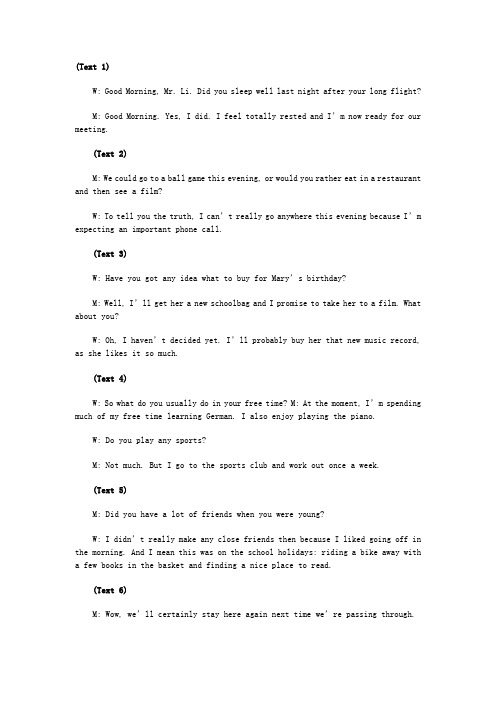
(Text 1)W: Good Morning, Mr. Li. Did you sleep well last night after your long flight?M: Good Morning. Yes, I did. I feel totally rested and I’m now ready for our meeting.(Text 2)M: We could go to a ball game this evening, or would you rather eat in a restaurant and then see a film?W: To tell you the truth, I can’t really go anywhere this evening because I’m expecting an important phone call.(Text 3)W: Have you got any idea what to buy for Mary’s birthday?M: Well, I’ll get her a new schoolbag and I promise to take her to a film. What about you?W: Oh, I haven’t decided yet. I’ll probably buy her that new music record, as she likes it so much.(Text 4)W: So what do you usually do in your free time? M: At the moment, I’m spending much of my free time learning German. I also enjoy playing the piano.W: Do you play any sports?M: Not much. But I go to the sports club and work out once a week.(Text 5)M: Did you have a lot of friends when you were young?W: I didn’t really make any close friends then because I liked going off in the morning. And I mean this was on the school holidays: riding a bike away with a few books in the basket and finding a nice place to read.(Text 6)M: Wow, we’ll certainly stay here again next time we’re passing through.W: Good. Do let us know in advance and we’ll try to get you the same room.M: That would be lovely. It may be quite soon in fact.W: Oh, how’s that?M: Well, we’re driving to the south of Spain in the next couple of day s. And we may come back this way.W: Do give us a ring if you decide to. I hope you have a pleasant trip.(Text 7)M: Great!This supermarket has everything. I hope this comes to under 75 dollars because I don’t have much money left.W: That comes to 75 dollars and 5 cents.M: I knew it. I knew I’d be over.W: Well, don’t worry about the five cents. They’ll go. Have a nice day.M: Well, thank you. See you again!(Text 8)W: John, I thought you were going to leave early today to take your son to the show.M: I’m still planning to. But I can’t leave until I finish typing all the letters.W: Can’t you leave that until tomorrow?M: No, the boss wants them first thing tomorrow morning.W: How many have you got left?M: About five.W: Why don’t you just go ahead, John? I’ll do the letters for you.M: Thank you very much, Janet. You’re so kind.(Text 9)M: Customs Service, Anderny Grand speaking. How may I help you?W: I can’t believe this is happening. I called and ordered a 32-inch bag last Friday. But today I found you sent a 24-inch one. I was planning to use that bag during our vacation in Mexico but it doesn’t seem possible any more because we’ll take off on Saturday. It’s only two days away. What am I supposed to do?M: I’m really sorry, madam. I’ll check right away. Would you please tell me your order number?W: It’s CA2938.M: Oh, just a minute. I do apologize, madam. There did seem to be a mistake. I’ll have the correct size bag sent to you by overnight mail right a way. It will arrive in time for your Saturday trip. Again I apologize for any inconvenience caused by our mistake. I promise it won’t happen again.W: OK. Well, thank you.M: Thank you, madam, for choosing Linch Mail. I hope you have a wonderful vacation.(Text 10)M: Juliet, you chose not to go to college. Why? Was it about money?W: Well. I don’t want to sit here and say I was too poor to go to college. But the fact is that we didn’t have the money, though my mum probably could have made enough somehow. I probably could have worked harder at school and gotten better grades, so, it is really, I didn’t get to go to college. I had wished to go back to school every other week. It just wasn’t my path.M: At the time did you feel like you were missing something?W: My best friend went off to university. And I just remember every time I talked to her. It all sounded so fun and so great. And here I was selling tennis shoes and getting on the bus every day to work in town. We both thought the other per son’s life was so much more exciting. I was trying hard to make enough to pay for my own flat every month. And that seems so exciting to her. And she would talk about studying for finals and going to parties. And I thought, God, she’s so perfect.1~5 BABAC 6~10 ABBCA 11~15 CBCAC 16~20 CACBB。
2004年英语听力(全国卷Ⅰ)听力真题+答案
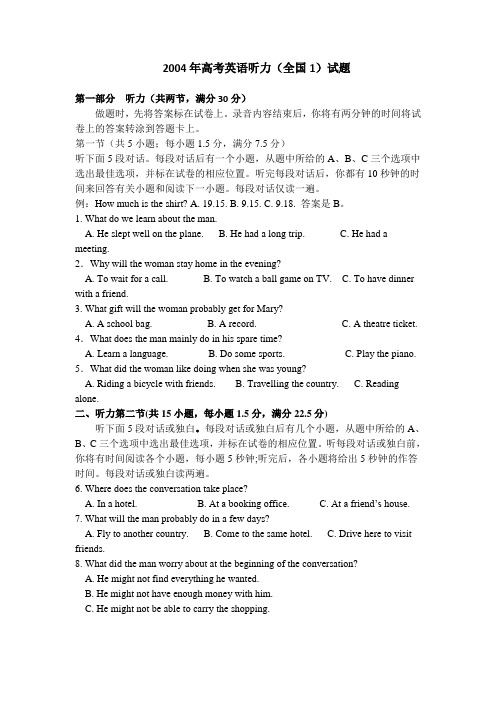
2004年高考英语听力(全国1)试题第一部分听力(共两节,满分30分)做题时,先将答案标在试卷上。
录音内容结束后,你将有两分钟的时间将试卷上的答案转涂到答题卡上。
第一节(共5小题;每小题1.5分,满分7.5分)听下面5段对话。
每段对话后有一个小题,从题中所给的A、B、C三个选项中选出最佳选项,并标在试卷的相应位置。
听完每段对话后,你都有10秒钟的时间来回答有关小题和阅读下一小题。
每段对话仅读一遍。
例:How much is the shirt? A. 19.15. B. 9.15. C. 9.18. 答案是B。
1. What do we learn about the man.A. He slept well on the plane.B. He had a long trip.C. He had a meeting.2.Why will the woman stay home in the evening?A. To wait for a call.B. To watch a ball game on TV.C. To have dinner with a friend.3. What gift will the woman probably get for Mary?A. A school bag.B. A record.C. A theatre ticket. 4.What does the man mainly do in his spare time?A. Learn a language.B. Do some sports.C. Play the piano. 5.What did the woman like doing when she was young?A. Riding a bicycle with friends.B. Travelling the country.C. Reading alone.二、听力第二节(共15小题,每小题1.5分,满分22.5分)听下面5段对话或独白。
电子科技大学研究生历年学位英语考试试题及答案汇编(4)-百.知识讲解
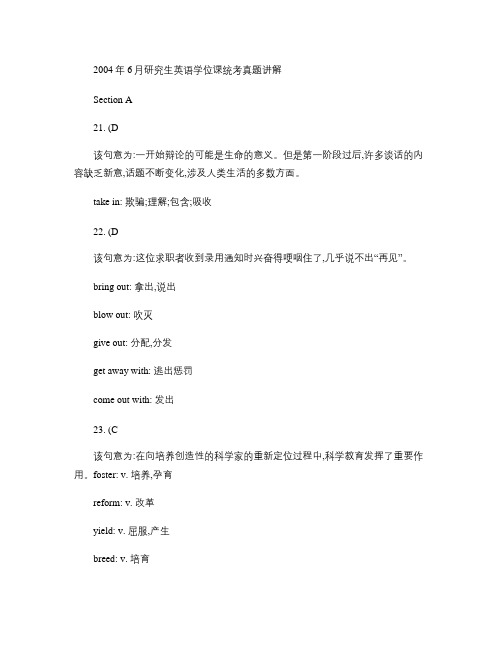
2004年6月研究生英语学位课统考真题讲解Section A21. (D该句意为:一开始辩论的可能是生命的意义。
但是第一阶段过后,许多谈话的内容缺乏新意,话题不断变化,涉及人类生活的多数方面。
take in: 欺骗;理解;包含;吸收22. (D该句意为:这位求职者收到录用通知时兴奋得哽咽住了,几乎说不出“再见”。
bring out: 拿出,说出blow out: 吹灭give out: 分配,分发get away with: 逃出惩罚come out with: 发出23. (C该句意为:在向培养创造性的科学家的重新定位过程中,科学教育发挥了重要作用。
foster: v. 培养,孕育reform: v. 改革yield: v. 屈服,产生breed: v. 培育conceive: v. 孕育;思考24. (A该句意为:一旦建议得以实施,就几乎不可能推翻它。
reverse: v. 颠倒,推翻,撤消overthrow: v. 推翻enhance: v. 加强implement: v. 执行provoke: v. 激起,挑动25. (B该句意为:守时的人总是在必须处理某事时把此事处理好。
attend to: 招待,照料,处理participate in: 参见see to: 处理concentrate on: 集中于be involved in: 参与,卷入26. (B该句意为:这些研究生中多数只有一个志向-当一流经济学家。
aspiration (ambition: n. 志向,抱负inspiration: n. 灵感,鼓励request: n. 请求,要求,需求acquisition: n. 获得27. (A该句意为:几乎每次我去她房间,都会发现她在专心学习。
be immersed in (be absorbed in: v. 专心于……be submerged in: v. 被……浸泡be saturated with: v. 饱和be agonized by: v. 受……之苦28. (B该句意为:最新的证据表明,禽流感再次爆发的可能性已经排除。
2004老生电子技术
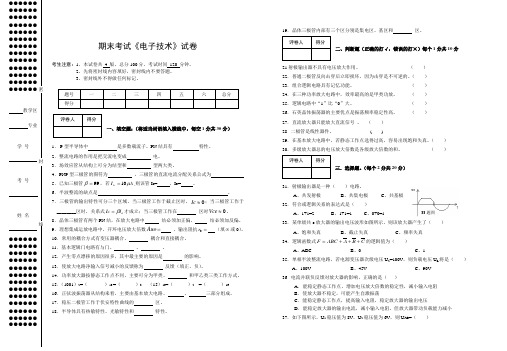
期末考试《电子技术》试卷考生注意:1、本试卷共 4 版,总分100分,考试时间 120 分钟。
2、先将密封线内容填好,密封线内不要答题。
3、密封线外不得做任何标记。
一、填空题:(将适当词语填入横线中,每空1分共30分)1. P 型半导体中 是多数载流子。
PN 结具有 特性。
2.整流电路的作用是把交流电变成 电。
3.场效应管从结构上可分为结型和 型两大类。
4.PNP 型三极管的图符为 ,三极管的直流电流分配关系公式为 5.已知三极管99=β,若A I b μ10=,则该管Ic= ,Ie= 。
6.半波整流的缺点是 。
7.三极管的输出特性可分三个区域,当三极管工作于截止区时,0≈Ic ;当三极管工作于 ________区时,关系式b I Ic β=才成立;当三极管工作在 区时0≈Vce 。
8.晶体三极管有两个PN 结,在放大电路中 结必须加正偏, 结必须加反偏。
9.理想集成运放电路中,开环电压放大倍数=Auo ,输出阻抗=0r (填∞或0)。
10.常用的耦合方式有变压器耦合、 耦合和直接耦合。
11.基本逻辑门电路有与门、 、 。
12.产生零点漂移的原因很多,其中最主要的原因是 的影响。
13.使放大电路净输入信号减小的反馈称为 反馈(填正、负)。
14.功率放大器按静态工作点不同,主要可分为甲类、 和甲乙类三类工作方式。
15.(1001)2=( )10 =( )8 (15)10=( )2 =( )16 16.正弦波振荡器从结构来看,主要由基本放大电路、 、 三部分组成。
17.稳压二极管工作于伏安特性曲线的 区。
18.半导体具有热敏特性、光敏特性和 特性。
19.晶体三极管内部有三个区分别是集电区、基区和 区。
二、判断题(正确的打√,错误的打×)每个1分共10分21射极输出器不具有电压放大作用。
( ) 22.普通二极管反向击穿后立即损坏,因为击穿是不可逆的。
( ) 23.组合逻辑电路具有记忆功能。
系列试卷与答案
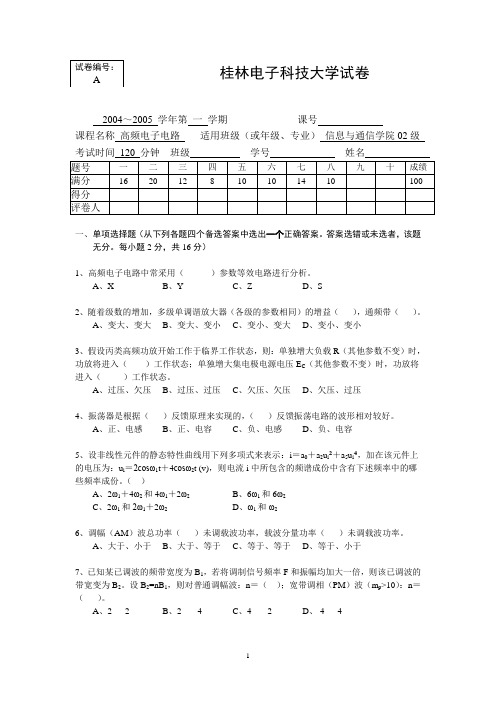
桂林电子科技大学试卷2004~2005 学年第 一 学期 课号课程名称 高频电子电路 适用班级(或年级、专业) 信息与通信学院02级 考试时间 120 分钟 班级 学号 姓名一、单项选择题(从下列各题四个备选答案中选出一个正确答案。
答案选错或未选者,该题无分。
每小题2分,共16分)1、高频电子电路中常采用( )参数等效电路进行分析。
A 、XB 、YC 、ZD 、S2、随着级数的增加,多级单调谐放大器(各级的参数相同)的增益( ),通频带( )。
A 、变大、变大B 、变大、变小C 、变小、变大D 、变小、变小3、假设丙类高频功放开始工作于临界工作状态,则:单独增大负载R (其他参数不变)时,功放将进入( )工作状态;单独增大集电极电源电压EC (其他参数不变)时,功放将进入( )工作状态。
A 、过压、欠压B 、过压、过压C 、欠压、欠压D 、欠压、过压4、振荡器是根据( )反馈原理来实现的,( )反馈振荡电路的波形相对较好。
A 、正、电感B 、正、电容C 、负、电感D 、负、电容5、设非线性元件的静态特性曲线用下列多项式来表示:i =a 0+a 2u i 2+a 5u i 4,加在该元件上的电压为:u i =2cosω1t +4cosω2t (v),则电流i 中所包含的频谱成份中含有下述频率中的哪些频率成份。
( )A 、2ω1+4ω2和4ω1+2ω2B 、6ω1和6ω2C 、2ω1和2ω1+2ω2D 、ω1和ω26、调幅(AM )波总功率( )未调载波功率,载波分量功率( )未调载波功率。
A 、大于、小于 B 、大于、等于 C 、等于、等于 D 、等于、小于7、已知某已调波的频带宽度为B 1,若将调制信号频率F 和振幅均加大一倍,则该已调波的带宽变为B 2。
设B 2=nB 1,则对普通调幅波:n =( );宽带调相(PM )波(m p >10):n =( )。
A 、2 2B 、2 4C 、4 2D 、 4 48、调制信号频率F 增大,则调频(FM )波的最大频偏( ),调相(PM )波的最大频偏( )。
